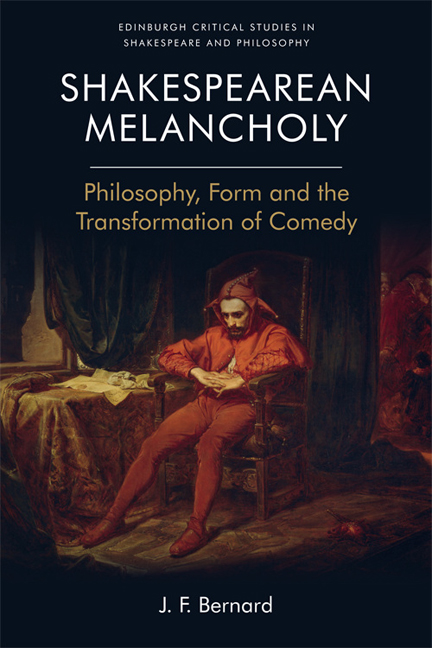Book contents
- Frontmatter
- Contents
- Acknowledgements
- Series Editor's Preface
- Miscellaneous Frontmatter
- 1 What's so Funny about Humours? Melancholy, Comedy and Revisionist Philosophy
- 2 Comic Symmetry and English Melancholy
- 3 Melancholic Dissonance and the Limits of Psycho-Humoralism
- 4 Melancholic Ambience at the Comic Close
- 5 Melancomic Time in Late Shakespeare
- 6 The Philosophical Afterlives of Shakespearean Melancholy
- Works Cited
- Index
4 - Melancholic Ambience at the Comic Close
Published online by Cambridge University Press: 14 September 2018
- Frontmatter
- Contents
- Acknowledgements
- Series Editor's Preface
- Miscellaneous Frontmatter
- 1 What's so Funny about Humours? Melancholy, Comedy and Revisionist Philosophy
- 2 Comic Symmetry and English Melancholy
- 3 Melancholic Dissonance and the Limits of Psycho-Humoralism
- 4 Melancholic Ambience at the Comic Close
- 5 Melancomic Time in Late Shakespeare
- 6 The Philosophical Afterlives of Shakespearean Melancholy
- Works Cited
- Index
Summary
In trying to establish a comprehensive chronology of Shakespearean drama, eighteenth-century critic Edmond Malone reached the editorial conclusion that Twelfth Night was Shakespeare's final play, explaining that the comedy ‘bears evident marks of having been composed at leisure, as most of the characters that it contains are finished to a higher degree of dramatic perfection than is discoverable in some of our author's earlier comic performances’. Erroneous as it is, Malone's argument echoes a widespread perception of the play as the apogee of Shakespearean comedy. Generically speaking, Shakespeare's last comedies are As You Like It and Twelfth Night, written at the cusp of the seventeenth century, ahead of his major tragic works. As this chapter suggests, the two plays also represent his most overt and paradoxical treatments of melancholy. They can be understood as completing the shift towards a novel understanding of the concept that exceeds characterisation. Though replete with melancholic characters, the comedies foster a sense of comic melancholy tied to ideas of setting and landscape that legitimises it as valid comic emotion.
The idea that a landscape could prove melancholic is generally held as a modern one, whereas, through literature, ‘the word melancholy lost the sense of a quality and acquired instead that of a mood that could be transferred to inanimate objects’. This understanding, in turn, resonates with medical considerations of the relationship between melancholy and landscapes. As Jennifer Radden explains, the potential transference of an inner state of melancholy onto a natural phenomenon results from our innate capacity (and desire) to attach our affective states onto our visual environment. ‘We attribute melancholy to landscapes’, she writes, ‘by some alchemy derived from the associative attachment between visual and affective aspects of our conception of melancholy. Aspects of the landscape make us think of, not (or not merely) feel melancholy.’ The landscape becomes an extension of more than a reminder of an individual's melancholy, we read it more than experience it as melancholic. As I argue in this chapter, a similar pattern operates in As You Like It and Twelfth Night, which transpose their melancholy onto their respective dramatic landscapes. Arden Forest and Illyria are remote playworlds whose insular wistfulness exudes frivolity and leisure. They are also settings in which melancholy proliferates without impinging too harshly on social or comic structures as it does in Messina, Ephesus or Venice.
- Type
- Chapter
- Information
- Shakespearean MelancholyPhilosophy, Form and the Transformation of Comedy, pp. 135 - 173Publisher: Edinburgh University PressPrint publication year: 2018



